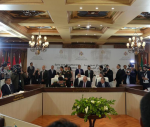You are here
Is there a constitutional suspicion in trade union laws?
Apr 07,2024 - Last updated at Apr 07,2024
First, I would like to point out that paragraph two of article 16 of the Jordanian Constitution stipulates that “Jordanians have the right to form associations, unions and political parties, provided that their goals are legitimate, their means are peaceful, and they have bylaws that do not violate the provisions of the constitution.” This means that the constitution has guaranteed the right of Jordanians to join unions without coercion. Accordingly, it is not permissible to stipulate in any law or bylaw that it is compulsory to belong to unions, and it is also not permissible to stipulate that it is compulsory to participate in their funds, including the pension fund. It is not in the state’s interest to stipulate that membership in unions is compulsory.
In the beginning, the liberal professions were not subject to social security. For this and other motives and reasons, unions worked to establish pension funds for members in addition to investment and savings funds.
Currently, social security is an alternative to all types of pension funds, including union pension funds. Therefore, I propose to stop new participations in union pension funds completely in order to limit their use for electoral purposes, especially while they are in a state of bankruptcy, and this bankruptcy has negative social and security effects at the national level. In return, I suggest maintaining investment funds that bear profit and loss, as their success depends on achievement.
Bylaw no. 84 of 2023 amending the pension bylaw for members of the Engineers Syndicate stipulates that the syndicate member must participate in the pension fund, as the syndicate member is considered a participant by law in the pension fund from the date of his/her membership in the syndicate
It is not valid to make it mandatory for new members to participate in these pension funds in any way. Rather, I find it as violating the constitution. It is not permissible to increase their monthly contribution in order to provide the amount of pension salaries for currently retired members at the expense of new members.
The correct solution is to reconsider these pension salaries, adjust them and turn to other sources, such as investment, to provide sustainable financing for them, not to charge them to new members.
Governments have roles, and it is not right to abandon or overlook any of them. Rather, they must follow up on all the events and challenges that take place in the arena and control any practices or trends within the framework of the supreme national interest.
The work of institutions, companies, unions and others is subject to their follow-up to ensure its consistency with the public interest. It is not right for governments to approve any bylaws that burden new graduates just because these bylaws solve an immediate problem that unions have, which is providing funding for current pensions.
The Political Parties Law regulates the work of parties, and each of them has its own bylaw, while each union has its own law. I believe that the laws should be for the profession and not the union. For example, we say “the law of the legal profession” and not, as in Jordan, “the law of the bar association”. The matter, of course, applies to the rest of the professions. This is the practice in many countries of the world and Arab countries.
It is logical that the laws are for professions and not for unions, and they constitute the legislative frameworks that regulate these professions. The regulatory role for the professions is originally for ministries and government departments with the contribution of the unions and not for the unions. I suggest that there be a single law to regulate trade union work that would serve as a unified legislative framework from which internal or basic bylaws would approve for the unions along the lines of political parties. Therefore, the authority for the obligation to implement these laws (as stipulated in the last article of any law) rests with the prime minister and the ministers. This means, in my opinion, that it is not permissible to issue laws for unions and that issuing them violates the second paragraph of Article 16 of the Jordanian Constitution, which stipulates that unions must have bylaws (not laws) that do not violate the provisions of the constitution. That is why parties operate under bylaws under the umbrella of the Political Parties Law, and not every party has a law.
The Jordanian Bar Association is considered the first professional association in Jordan, as it was established in 1950. The issuance of the Bar Association Law No. 31 of 1950 was a dangerous precedent pushed by specialists through their role in preparing legislation and participating in its approval, and it was unfortunately followed by the rest of the unions. That is why unions operate under laws and derive their strength from the law. This type of legislative precedent represents a problem rooted in the legislation. For example, if a law or bylaw pertaining to an institution included a specific defect when it was issued, this defect extends to the rest of the laws and bylaws of other institutions as a matter of demanding the same and analogy to that legislative precedent.
I am not a legalist, but I say, and I have arguments and defences for what I say, that no laws may be issued except by state institutions because the responsibility for commitment to implementing the law falls on the Council of Ministers and the ministers, including the prime minister. Accordingly, is it permissible to issue a law for a union and the government is responsible for implementing it?
I believe that unions should operate under bylaws, not laws, in line with the text of paragraph 2 of article 16 of the constitution, and I repeat its text once again: “Jordanians have the right to form associations, unions and political parties, provided that their goals are legitimate, their means are peaceful, and they have bylaws that do not violate the provisions of the constitution.”
Therefore, the matter requires legal remedies and reconciliation of the situation within a specific period of time. It is not in the state’s interest, especially in light of these grave challenges and dangers facing it, to keep unions operating under laws rather than bylaws. It is more correct to operate according to bylaws, as stipulated in the constitution. These bylaws emerge from a single law that regulates the work of unions. Thus, in their dealings with the state, unions do not show any manifestations of bullying that reaches the stage of signing memorandums between them as “representatives of employees” and the ministries or government institutions in which they work, as happened during the era of the previous government. Thus, we are free from manifestations of bullying the state or attempts to twist the arms of its institutions.
Comprehensive modernisation, with its political, economic and administrative dimensions, requires depth and foresight and not just superficial formal treatments — which may delay rather than advance, because they do not go beyond the form and the peels and do not extend to the roots.
Let us all know that the policies of patchwork and passing the days do not serve the state in any way. The future of generations is a trust in everyone’s hands.














Add new comment